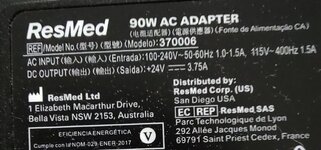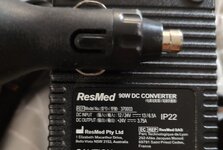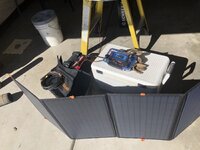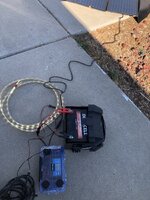Navigation
Install the app
How to install the app on iOS
Follow along with the video below to see how to install our site as a web app on your home screen.
Note: This feature may not be available in some browsers.
More options
Style variation
You are using an out of date browser. It may not display this or other websites correctly.
You should upgrade or use an alternative browser.
You should upgrade or use an alternative browser.
C-PAP for back country hunt
- Thread starter JoeB
- Start date
Pretty good discussion here:
https://rokslide.com/forums/threads/cpap-anything-new-for-backpacking-camping.259798/
I went with a Breas Z2 auto and the Renogy 7200 mah battery. Used it at 11,000 feet and after the 4th night the battery still showed 50%. Could have gone longer but I switched batteries when we resupplied to make sure. It adds some weight to the pack, but I thought it was 110% worth it to get a good night's sleep.
https://rokslide.com/forums/threads/cpap-anything-new-for-backpacking-camping.259798/
I went with a Breas Z2 auto and the Renogy 7200 mah battery. Used it at 11,000 feet and after the 4th night the battery still showed 50%. Could have gone longer but I switched batteries when we resupplied to make sure. It adds some weight to the pack, but I thought it was 110% worth it to get a good night's sleep.
Thanks for the info!! I’ll check it outPretty good discussion here:
https://rokslide.com/forums/threads/cpap-anything-new-for-backpacking-camping.259798/
I went with a Breas Z2 auto and the Renogy 7200 mah battery. Used it at 11,000 feet and after the 4th night the battery still showed 50%. Could have gone longer but I switched batteries when we resupplied to make sure. It adds some weight to the pack, but I thought it was 110% worth it to get a good night's sleep.
Mike Islander
WKR
Pretty good discussion here:
https://rokslide.com/forums/threads/cpap-anything-new-for-backpacking-camping.259798/
I went with a Breas Z2 auto and the Renogy 7200 mah battery. Used it at 11,000 feet and after the 4th night the battery still showed 50%. Could have gone longer but I switched batteries when we resupplied to make sure. It adds some weight to the pack, but I thought it was 110% worth it to get a good night's sleep.
Wow! My brother in law flattened my 650 CCA car battery after about 8 hours. I guess his CPAP is a watt-hog?
I have a resmed mini and used the Nomad 75. It will last two days before needing a charge. I can connect it to a solar panel and get enough to last another 4-5 hours a night if there is ample daylight. I might look for a different portable battery pack.
I got this cable off of ebay to connect the cpap to the portable battery pack.

I got this cable off of ebay to connect the cpap to the portable battery pack.

USB-C Adapter Power Supply Cable for ResMed AirMini/AirSense 11 | eBay
This is the only power cable that should be used with your AirMini / AirSense 11 machine. Supports both AirMini and AirSense 11. Output Connector: AirMini or AirSense 11. When taking off the mask, AirMini (with SmartStop ON) requires more power to spin up the motor for max air output.
www.ebay.com
tim tarras
WKR
They have the same one on Amazon for way less $$$$.I have a resmed mini and used the Nomad 75. It will last two days before needing a charge. I can connect it to a solar panel and get enough to last another 4-5 hours a night if there is ample daylight. I might look for a different portable battery pack.
I got this cable off of ebay to connect the cpap to the portable battery pack.

USB-C Adapter Power Supply Cable for ResMed AirMini/AirSense 11 | eBay
This is the only power cable that should be used with your AirMini / AirSense 11 machine. Supports both AirMini and AirSense 11. Output Connector: AirMini or AirSense 11. When taking off the mask, AirMini (with SmartStop ON) requires more power to spin up the motor for max air output.www.ebay.com
If he was using his home one and had the heat on to heat the water chamber and hose it uses a lot of power. Some models have an adapter so you don't have to use the water chamber or just run it with no water and turn the heat off to the chamber and hose.Wow! My brother in law flattened my 650 CCA car battery after about 8 hours. I guess his CPAP is a watt-hog?
The portable one I have has none of these features and will easily last 3-4 days, depending of temperature in camp.
11boo
WKR
Most CPAP are 12v with a inverter on the plug for 110v. You should be able to get a 12v cord for your specific unit to avoid any extra loss.
Cheapest $ per watt hour I have come across is the Jupitek s1200. $300 for 1250watt hours (might get a solar panel for free also when purchasing). Depending on your machine and the level you need to run (and if you want humidifier on), you could get up to 4-5 days on a single charge.
Cheapest $ per watt hour I have come across is the Jupitek s1200. $300 for 1250watt hours (might get a solar panel for free also when purchasing). Depending on your machine and the level you need to run (and if you want humidifier on), you could get up to 4-5 days on a single charge.
Mike Islander
WKR
So, is the key to isolated camping a special CPAP that uses far less power than one that might generally be used in the home? Cause those home units burn 65 watts or more.
The wattage varies during use. So the average should be lower. Pretty much any CPAP works fine.So, is the key to isolated camping a special CPAP that uses far less power than one that might generally be used in the home? Cause those home units burn 65 watts or more.
The energy use will be higher with higher pressures, humidifier, and converting 12v to 120v. That same CPAP might only use 25-30w/hr.
I was active on the thread in the second post of this one. I slept on the renogy with a transcend cpap for 2 nights at elevation before we came down and moved spots. I plugged it in on the 2 hour drive to the next spot and got another 4 nights out of it. Every use case is different. Are you packing camp on your back? Are you coming to the truck every night? I hope you find a good option for you. Keep us posted
Sent from my iPhone using Tapatalk
Sent from my iPhone using Tapatalk
Mike Islander
WKR
The wattage varies during use. So the average should be lower. Pretty much any CPAP works fine.
The energy use will be higher with higher pressures, humidifier, and converting 12v to 120v. That same CPAP might only use 25-30w/hr.
Car inverter is 80-90% efficient. But his CPAP runs 65 mA in normal use. It's a home variety. Not sure if he can turn off humidity, heater, etc. I'll get him to send me the model number to see what we can do to make it work. Otherwise I'll probably get him a "camping" model for his next birthday.
Like @Titan said, the most efficient machine to run on a battery is one that uses an input of 12V. All CPAP machines use DC, but not all are 12V. Look at the box on the power cord that came with the machine and see what the output is. Here is one from a Resmed airsense 10.

The box converts 110V AC to 24V DC. You can also buy a DC cord for the machine that plugs into a 12V cigarette lighter (see below).

This will convert 12V DC to 24V DC but you will still loose efficiency because of the conversion.
A machine that uses 12V DC input will maximize battery life.

The box converts 110V AC to 24V DC. You can also buy a DC cord for the machine that plugs into a 12V cigarette lighter (see below).

This will convert 12V DC to 24V DC but you will still loose efficiency because of the conversion.
A machine that uses 12V DC input will maximize battery life.
Have you used one? If so did it work good enough to get some sleep in the back country?Ever thought about a MAD, it’s a small plastic mouth guard that keeps your lower jaw from falling back, used for milder sleep apnea.
I haven’t tried it in the backcountry, but I wear them all other times, the wife is a dentist and really big on airway and sleep stuff so I was fitted for one pretty quickly into our relationship hahaHave you used one? If so did it work good enough to get some sleep in the back country?
Similar threads
- Replies
- 27
- Views
- 945
- Replies
- 36
- Views
- 867
- Replies
- 21
- Views
- 827
Featured Video
Latest Articles
- TT#62 Brian Barney Hunting Bulls without Calling
- Hoyt Alpha AX-2 SD Review
- Kuiu Kenai vs Outdoor Vitals Vario Hooded Jacket Review
- Hoyt RX-9 Ultra Review
- Hunting Vampire Bucks & Building an Optics Kit
- Darton Sequel ST2 35 Review
- TT#61 Gear and Skills for Success with Aron Snyder
- Vortex Viper Shotgun Enclosed Micro Red Dot Review
- Howard’s Total Vise Legacy Bow Press
- Tcams, Point Creep, Scouting, & The Hunt Source Podcast


